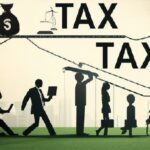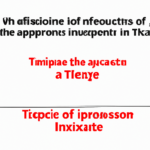Criticisms of progressive taxation revolve around several potential drawbacks. Critics argue that it can discourage individuals from working hard and achieving success, as higher incomes are subject to higher tax rates. There is concern that this redistribution of wealth could hinder economic growth and innovation. Some individuals feel that progressive taxation is inherently unfair, as it places a heavier burden on the wealthy while providing fewer benefits to them. Additionally, critics mention that it can be complex and administratively burdensome to implement. Overall, these criticisms highlight the need for a careful balance between addressing income inequality and fostering economic prosperity.
Table of Contents
- Administrative complexity
- Erosion of incentives
- Impact on economic growth
- Potential for tax avoidance
- Redistribution of wealth.
(The Progressive Income Tax: A Tale of Three Brothers)
Progressive taxation has long been a topic of debate and scrutiny. While it aims to create a fairer system by taxing higher-income individuals at a higher rate, it is not without criticisms and potential drawbacks.
One criticism of progressive taxation is that it discourages hard work and success. By imposing higher tax rates on those who earn more, individuals may feel less motivated to work harder and earn more money. This can hinder economic growth and entrepreneurship, as individuals may choose to work less or move their assets to countries with lower tax rates.
Another drawback is that progressive taxation can lead to a reduction in savings and investment. When individuals are taxed at higher rates, they have less money available to save and invest in businesses and the economy. This can impact overall economic growth and development.
Progressive taxation also faces criticism for its potential to stifle innovation and risk-taking. High-income individuals often provide the necessary capital for research and development, as well as start-ups and new ventures. If these individuals are burdened with high tax rates, they may become less willing to invest in such ventures, leading to a slowdown in innovation and economic progress.
Furthermore, progressive taxation can create a sense of unfairness among taxpayers. Some argue that it penalizes success and rewards mediocrity. This can breed resentment and discourage individuals from pursuing their full potential.
In summary, while progressive taxation aims to create a fairer tax system, it is not without its criticisms and potential drawbacks. It can discourage hard work, reduce savings and investment, stifle innovation, and create a sense of unfairness. Striking the right balance between equitable taxation and fostering economic growth remains an ongoing challenge for policymakers.
Administrative complexity
Administrative complexity is a significant issue that arises with progressive taxation systems. This complexity refers to the intricate and burdensome nature of the administrative processes required to implement and manage such a system.
One of the criticisms of progressive taxation is the extensive paperwork and documentation that is necessary to determine tax liability accurately. Taxpayers are often required to provide detailed financial information, such as income statements, expense records, and investment portfolios. This can be time-consuming and tedious, leading to frustration for individuals and businesses alike.
Moreover, the complexity of progressive taxation often results in a need for specialized expertise. Tax professionals, such as accountants and tax lawyers, are increasingly required to navigate the intricacies of the tax code. This reliance on experts creates additional costs for taxpayers, as professional services come at a premium.
Another drawback of administrative complexity is the potential for errors and misunderstandings. The complicated calculations involved in determining tax liability leave room for mistakes, which can lead to discrepancies in the amount of tax owed. Additionally, the complexity of the system can make it difficult for taxpayers to fully understand their obligations, leading to unintentional non-compliance with tax laws.
The administrative burden of progressive taxation also falls heavily on government agencies tasked with enforcing and collecting taxes. These agencies must dedicate significant resources to ensuring compliance, which diverts funds and personnel from other important areas of governance.
Furthermore, the complexity of progressive taxation can create loopholes and opportunities for tax evasion. Individuals and businesses with sufficient financial resources may exploit these complexities to reduce their tax burden, further exacerbating income inequality.
In conclusion, administrative complexity is a valid criticism and potential drawback of progressive taxation. The intricate paperwork, reliance on specialized expertise, potential for errors and misunderstandings, burden on government agencies, and opportunities for tax evasion all contribute to the challenges associated with implementing and managing a progressive tax system. These complexities should be carefully considered and mitigated to ensure that progressive taxation remains an effective and equitable means of distributing the tax burden.
Erosion of incentives
Erosion of incentives is a significant concern raised when discussing potential drawbacks of progressive taxation. Under this tax system, where higher-income individuals are required to pay a greater proportion of their income in taxes, there is a risk that it may reduce the motivation for individuals to work harder, innovate, and take risks.
When faced with higher tax rates, individuals may feel that the rewards for their efforts are diminished, as a large portion of their additional income is consumed by taxes. This reduction in incentives to strive for greater success can hinder economic growth and innovation, as individuals may choose to work less or make fewer investments.
Moreover, progressive taxation can create a disincentive for entrepreneurs and business owners to expand their enterprises. As their profits increase, so does the percentage they are required to pay in taxes. This can discourage individuals from reinvesting their profits into their businesses, leading to reduced expansion and job creation.
Another aspect of the erosion of incentives is the potential negative impact on productivity. If individuals perceive that the financial rewards for their efforts are significantly reduced due to higher tax rates, they may be less inclined to put in the extra effort required to excel in their fields.
Additionally, progressive taxation can result in a brain drain, where highly skilled and successful individuals relocate to countries with lower tax rates. This can be detrimental to an economy’s growth and development, as it may lead to the loss of valuable human capital and expertise.
However, it is essential to note that the erosion of incentives is not a universal consequence of progressive taxation. Other factors such as social welfare programs, public services, and the overall fairness of the tax system can influence individuals’ perceptions and motivations.
In conclusion, while progressive taxation aims to address income inequality and provide for a more equitable society, the erosion of incentives is a valid concern. Higher tax rates can potentially reduce the motivation for individuals to work harder, innovate, and invest. Balancing the need for a progressive tax system with the encouragement of individual effort and innovation is crucial for sustained economic growth and prosperity.
Impact on economic growth
Progressive taxation has been debated extensively, with critics pointing out potential drawbacks that could impact economic growth. One major concern is the effect on incentives to work and invest. Critics argue that higher tax rates on higher incomes discourage individuals from working harder or taking risks to grow their businesses. When faced with the prospect of earning less after taxes, individuals may choose to work less or not at all, resulting in decreased productivity and economic growth.
Furthermore, progressive taxation has the potential to discourage saving and investment. Critics argue that as tax rates increase, individuals have less money available to save and invest in businesses, which are vital for economic expansion. With less capital available for investment, businesses may struggle to grow, leading to decreased job opportunities and economic stagnation.
Additionally, progressive taxation can also lead to tax avoidance and evasion. Some argue that higher tax rates on higher incomes create an incentive for individuals to find loopholes or engage in illegal practices to minimize their tax burden. This can lead to a loss in government revenue and hinder the funding of crucial public services and infrastructure projects that are vital for economic growth.
Another potential drawback of progressive taxation is the impact on entrepreneurship. Critics argue that higher tax rates on higher incomes discourage individuals from starting their own businesses. The increased tax burden on the profits of entrepreneurs can make it harder for them to reinvest and expand their ventures. As a result, potential job opportunities and economic growth may be stifled.
Moreover, progressive taxation can lead to a brain drain phenomenon. Higher tax rates on higher incomes can prompt high-income individuals to relocate to countries with lower tax rates. This loss of highly skilled individuals can have a negative impact on innovation, productivity, and economic growth within a country.
While progressive taxation aims to promote income equality and provide necessary funds for public services, it is important to consider the potential drawbacks and their impact on economic growth. The debate surrounding progressive taxation continues, with proponents highlighting the importance of addressing income inequality, while critics emphasize the potential negative impact on incentives, savings, investment, entrepreneurship, and brain drain. A balanced approach is necessary to ensure that the tax system effectively supports economic growth without excessively burdening individuals and businesses.
(Progressive taxation and its benefits on our social services.)
Potential for tax avoidance
The potential for tax avoidance is a significant concern when it comes to progressive taxation. Progressive taxation aims to distribute the tax burden more fairly by taxing higher-income individuals at higher rates. However, this system also creates incentives for individuals to find ways to reduce their taxable income in order to avoid paying higher taxes.
One common way individuals can potentially avoid taxes is through the use of tax shelters. These are legal structures or strategies that allow individuals to minimize their tax liability by shifting income or assets to lower-tax jurisdictions. Tax havens, countries with low or no tax rates, are often utilized for this purpose. By establishing a presence in these jurisdictions or by utilizing complex financial arrangements, individuals can legally avoid paying higher taxes in their home country.
Another strategy used to potentially avoid taxes is through income shifting. This involves transferring income from high-tax individuals to lower-tax individuals within the same family or business entity. By doing so, individuals can lower their overall tax liability by taking advantage of lower tax rates that apply to the recipients of the income.
Tax avoidance is not limited to individuals alone. Corporations also often engage in various strategies to minimize their tax burden. This can include profit shifting, where multinational corporations allocate their profits to countries with lower tax rates, regardless of where the actual economic activity takes place. Additionally, companies may engage in transfer pricing, a method by which they artificially inflate expenses in high-tax jurisdictions and shift profits to low-tax jurisdictions.
While tax avoidance is often legal, it raises ethical concerns. It can lead to a loss in revenue for governments, which may then result in decreased funding for vital public services such as healthcare, education, and infrastructure. It can also contribute to a sense of unfairness among those who cannot afford to engage in such practices and may have to bear a higher tax burden as a result.
Efforts to address tax avoidance have been made, such as increasing international cooperation through initiatives like the OECD’s Base Erosion and Profit Shifting (BEPS) project. This project aims to create internationally coordinated measures to combat tax avoidance by multinational corporations.
In conclusion, the potential for tax avoidance is a significant issue associated with progressive taxation. As individuals and corporations seek to minimize their tax burden, they may utilize various strategies such as tax shelters, income shifting, profit shifting, and transfer pricing. While these practices are often legal, they raise ethical concerns and can result in a loss of revenue for governments. Efforts to combat tax avoidance continue, but it remains an ongoing challenge in maintaining a fair and effective tax system.
Redistribution of wealth.
Redistribution of wealth is a topic that often sparks debate and controversy. Critics of progressive taxation argue that it can have potential drawbacks and negative impacts on the economy.
One criticism of wealth redistribution is that it can discourage hard work and entrepreneurship. When individuals see that a large portion of their income will be taken away in taxes, they may be less motivated to work harder or take risks in starting their own businesses. This can lead to a decline in innovation and economic growth.
Another concern is that progressive taxation can create a culture of dependency. When wealth is redistributed through government programs, some individuals may become reliant on this assistance and lose the motivation to work and support themselves. This can create a cycle of poverty and limit upward mobility.
Critics also argue that progressive taxation can be unfair and arbitrary. They believe that individuals should be able to keep the fruits of their labor and that redistributing wealth goes against the principles of individual freedom and property rights. They argue that it is not the role of the government to determine how much income individuals should have or how it should be redistributed.
Furthermore, critics contend that progressive taxation can lead to capital flight and hinder economic investments. When taxes are high, individuals may choose to move their wealth to countries with more favorable tax rates, resulting in a loss of economic activity and job opportunities.
Additionally, some argue that progressive taxation can have unintended consequences on the middle class. While it is designed to target the wealthiest individuals, it can inadvertently impact small business owners and entrepreneurs who fall into higher tax brackets. This can stifle economic growth and hinder job creation.
In conclusion, while the concept of wealth redistribution may aim to create a more equitable society, critics of progressive taxation point out potential drawbacks and negative effects on the economy. These concerns include a reduction in work motivation, a culture of dependency, unfairness, capital flight, and unintended consequences for small business owners and the middle class. It is important for policymakers to carefully consider these criticisms and seek a balanced approach to ensure both fairness and economic growth.













